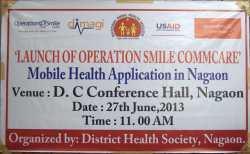
Operation Smile has launched a mobile health nutrition application in Assam, India. Created by Dimagi through a grant from USAID, the mobile health program will track the nutritional status of children with cleft lip and cleft palate in the district of Nagaon.
Operation Smile has launched a mobile health nutrition application in Assam, India. Created by Dimagi through a grant from USAID, the mobile health program will track the nutritional status of children with cleft lip and cleft palate in the district of Nagaon.
This mobile phone application will be used by the cleft nutrition team at Operation Smile’s Guwahati
Recently, Operation Smile conducted a 2 day training for 10 ASHA’s in the district of Nagaon. The ASHAs were trained on mobile phone use, basic nutrition anthropometric measures, and the mobile application, followed by field visits, travelling with each ASHA to the patients’ homes. These visits provided the ASHAs with the opportunity to bond with the patients and families.
Each year an estimated 1,000 children are born each year with a cleft in the state of Assam. Approximately 45,000 children and adults in Assam today are suffering from a cleft and 10 % of all cleft patients are too malnourished to receive surgery. This is because infants with clefts face severe difficulties with feeding. Without surgical repair, the nutritional status of many children with cleft lip and palate will continue to deteriorate. For surgical treatment to be safe and effective children must be healthy and sufficiently well-nourished; with decreased nutritional status the risk of complications greatly increases. With proper interventions, we can stop this vicious cycle by providing counseling to patients’ families to decrease the levels of malnourishment so that surgical care can be provided and children will no longer face these feeding difficulties.
Nutritional follow-up requires regular visits to monitor anthropometric data to assess if more counseling, supplements, or interventions are needed. Due to geographical, financial, and logistical constraints, many patients are not able to return as needed. This mobile health application will allow for an ASHA to collect this information at the child’s home. We will now be able to receive live up-to-date data alerting the nutrition team to the nutritional status of the patient. Because of this, children will be eligible for life saving surgery sooner, and enabling the team to identify emergency situations immediately.
What is next for GC4?
“GC4 has accomplished remarkable achievements and is fast gaining recognition from the most respected authorities in cleft care. We are now working with our team and partners to refine our processes and expand our services in comprehensive care. Together, we must continue to build the systems, practices, and team members that will systematically come up with solutions for children born with cleft lip, cleft palate, and other facial deformities,” said Dr. Alex Campbell, Medical Advisor and founding surgeon at the Guwahati Comprehensive Cleft Care Center (GC4). “Based on its conception and position, Guwahati has the opportunity to mature into one of the finest global centers in cleft care delivery, and to redefine quality healthcare delivery in the developing world. We hope that it will serve as one of the globe’s great success stories, and provide a blueprint for additional comprehensive centers within India and around the world. We see GC4 as beacon of hope, demonstrating that society’s most pressing and hopeless challenges are indeed surmountable.”
To read other posts in this exclusive ongoing series, please visit the Mobile Health Around the Globe main page. And if you have a Mobile Health Around the Globe story to tell, please post a comment below or email me at joan@socialmediatoday.com Thanks!

